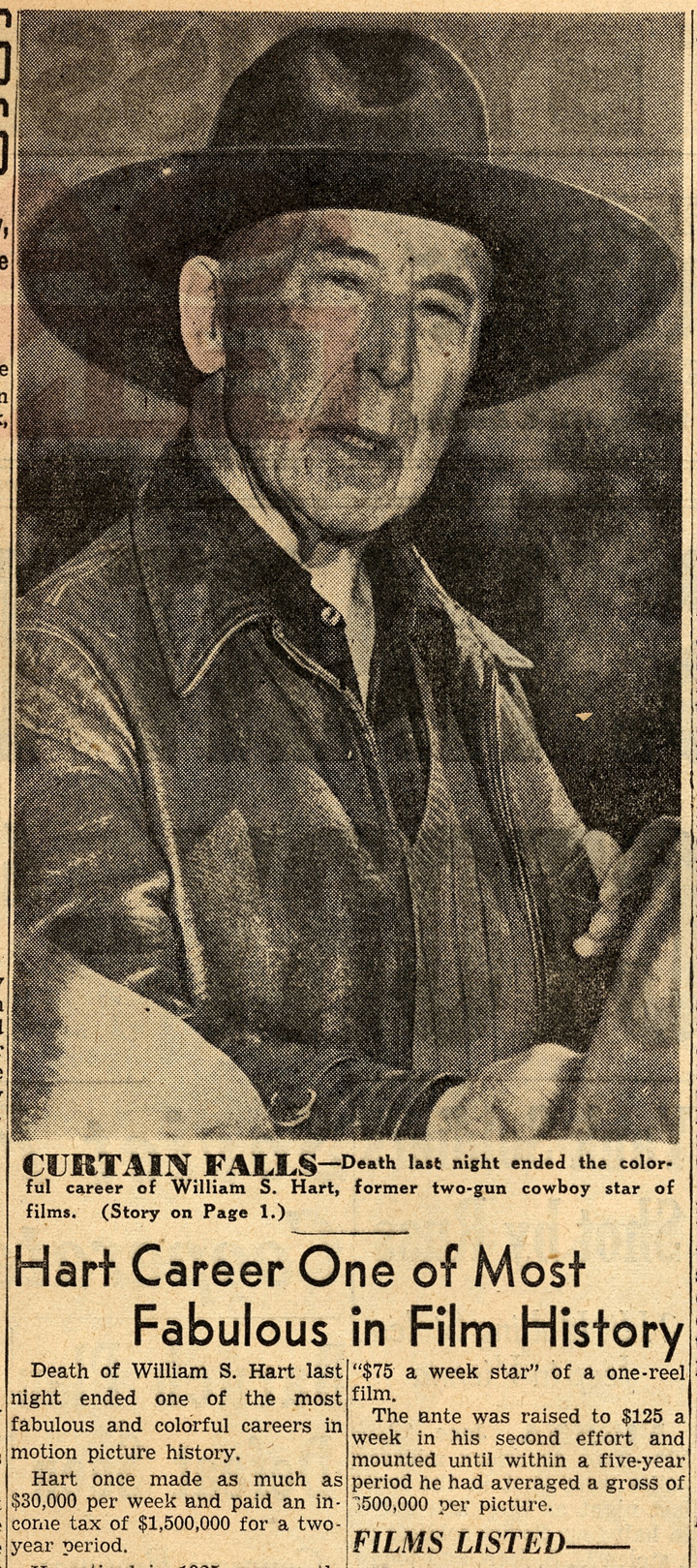|
|
Two-Gun William S. Hart Dies.
Los Angeles Examiner (newspaper),
Los Angeles, Cal.
Monday, June 24, 1946.
[Page 1] [Page 2] [Page 3] [Page 4]

Hart Career One of Most
Fabulous in Film HistoryDeath of William S. Hart last night ended one of the most fabulous and colorful careers in motion picture history.
Hart once made as much as $30,000 per week and paid an income tax of $1,500,000 for a two year period.
He retired in 1925, apparently piqued at studio heads, and never essayed a comeback although his fan mail was so heavy he once confided to a friend it cost him $15,000 a year to answer it.
In 1936, he sued United Artist film corporation for $500,000, alleging they had failed to exploit properly his last film, "Tumbleweeds." He was awarded $85,000.
Hart's marital venture was unfortunate.. He married Winifred Westover, an actress much younger than he, in 1921. They separated before their son was born a year later, and the actress divorced Hart in Reno in 1927.ONE OF 14----
The son, William S. Hart Jr., was only recently appointed guardian over his father after a court fight with two of the actor's acquaintances.
Hart was born in Newburgh, N. Y., December 6, 1862. One of 14 children, he migrated with his family to the Dakota territory at an early age and there learned the lore of the West, spending many hours with Sioux Indian children as playmates.
He returned to New York state with his family when he was 15, but abandoned a postal career there to go on the stage.
He became a leading man for such stars as Helena Modjeska, Ada Rheahan and Julia Arthur, and in 1914 came West after a triumph in the plays "The Squaw Man" and "The Virginian."
Of the latter role, Hart said:
"I gave, I believe, the first valid stage interpretation of a real cowpuncher."
A day after his arrival in Hollywood, Hart was at work—as a "$75 a week star" of a one-reel film.
The ante was raised to $125 a week in his second effort and mounted until within a five-year period he had averaged a gross of $500,000 per picture.FILMS LISTED----
Hart's memorable film efforts included "Wild Bill Hickok," "The Tiger Man," "Wagon Tracks," "Sand" and "The Narrow Trail." His famous horses, Paint and later Fritz, who died in 1938, shared the honors and were often part of the final scene when Hart delighted his youthful audiences by kissing the horse—and holding the heroine's hand.
In late years, Hart had been ill frequently and appeared subject to fits of melancholy since the death of his spinster sister, Mary.
Mary willed $150,000 for an animal shelter in Westport, Conn., upon her death and an additional $100,000 for a William S. Hart Memorial in Newhall.
Ed. note: By most accounts, Hart was born in 1864.
Newspaper images: 9600 dpi jpeg of 300 dpi jpg of original newspaper from the collection of Alan Pollack
The site owner makes no assertions as to ownership of any original copyrights to digitized images. However, these images are intended for Personal or Research use only. Any other kind of use, including but not limited to commercial or scholarly publication in any medium or format, public exhibition, or use online or in a web site, may be subject to additional restrictions including but not limited to the copyrights held by parties other than the site owner. USERS ARE SOLELY RESPONSIBLE for determining the existence of such rights and for obtaining any permissions and/or paying associated fees necessary for the proposed use.